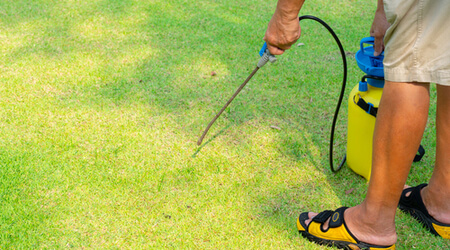
Paraquat is a commercial-grade herbicide that has been used to kill weeds and control grass since the 1960s. However, it has recently been linked with serious medical conditions. People working on or living near farms may have been exposed to this dangerous chemical. If you have been diagnosed with Parkinson’s disease and exposed to paraquat, you may have a right to seek significant compensation to cover your medical bills and related expenses.
Our attorneys at Joye Law Firm are reviewing cases of Parkinson’s disease linked to paraquat in South Carolina. Our compassionate attorneys can review your exposure history and discuss whether there is a potential link between paraquat and your disease. People working as farmers, agricultural workers, crop dusters, groundskeepers, or commercial pesticide applicators could be at the greatest risk.
However, those who reside in areas in close proximity to farms or other places using paraquat could also be at risk. We’ll look at your complete work and residential history because Parkinson’s symptoms may appear many years after exposure to the herbicide.
Our attorneys can discuss your legal options if you have questions about whether paraquat exposure caused your Parkinson’s disease. We are dedicated to using our skills to help people who need a caring legal advocate.
What Is Paraquat?
Paraquat is a highly toxic herbicide used to kill weeds and dry out agricultural crops before harvest. The full name is paraquat dichloride. It became commercially available in the United States in 1964.
Chevron Chemical manufactured, formulated, and distributed paraquat from 1964 until about 1986 under an agreement with Imperial Chemical Industries PLC (ICI), a legacy company of Syngenta. Today, Syngenta AG, an international agribusiness company, is a major manufacturer of paraquat. Syngenta markets paraquat under the brand name Gramoxone®.
Over the years, paraquat has been applied using handheld sprayers, knapsack sprayers, trucks with pressurized tanks, tractor-drawn pressurized tanks, and crop-duster aircraft. Because of its extreme toxicity, the use of paraquat is restricted to certified pesticide applicators who have received training in how to mix, load, and apply the herbicide.
The training emphasizes the safe handling of paraquat to avoid exposure. Paraquat can cause damage to bare skin and eyes upon contact and droplets of the herbicide in the spray mist can cause serious harm if inhaled. The aerosolized spray can drift from the intended application site, causing exposure to nearby communities.
In 2017, the EPA tightened restrictions on the use of paraquat and required that new warnings be added to the product labeling. The agency took the steps because of the disproportionately high number of fatal poisoning incidents associated with accidental ingestion of paraquat, compared to other pesticides.
The Centers for Disease Control and Prevention has a page about paraquat poisoning. The new warnings state that paraquat should never be used in residential or public recreational settings such as home gardens, schools, recreational parks, golf courses, or playgrounds.
In addition to the acute, immediate risks of exposure to paraquat, researchers have identified serious risks from long-term exposure to the herbicide.
The Link Between Paraquat and Parkinson’s Disease
Multiple studies have found a link between the use of paraquat and Parkinson’s disease.
Parkinson’s disease is a progressive, nervous system disease that begins in mid to late life. It affects 750,000 to 1 million Americans and millions of people worldwide. There is currently no known cure for the degenerative disease. The treatment options available are intended to help people manage the disease symptoms which may include impairment of motor function, muscle rigidity, slurred speech, and psychological and cognitive changes. The symptoms may advance over time.
In a 2016 memorandum discussing measures to reduce the risk of paraquat exposure, the Environmental Protection Agency said, “There is a large body of epidemiology data on paraquat dichloride use and Parkinson’s disease.”
A 2011 study conducted by researchers at the National Institute of Environmental Health Sciences (NIEHS) and the Parkinson’s Institute, found that people who used either paraquat or rotenone developed Parkinson’s disease two and half times more often than non-users. The authors studied 110 people with Parkinson’s and 358 matched controls from the Farming and Movement Evaluation (FAME) Study to evaluate the connection between pesticide exposure and the development of Parkinson’s disease.
Syngenta sought to dispute the findings of the study and erroneously claimed that the study showed people who used paraquat were less likely to develop Parkinson’s disease than the general population. The researchers said that Syngenta’s statement runs counter to the actual findings of the FAME study.
The Agricultural Health Study, a large study of cancer, neurological conditions, and other health effects in farming populations, tracked the health of 89,000 people from North Carolina and Iowa. The study included more than 52,000 farmers who applied pesticides as part of their farm work, 32,000 farm spouses, and about 4,900 commercial pesticide applicators. The study found that Parkinson’s disease was more common among the study participants who reported significant use of paraquat.
In a New York Times article, Dr. Samuel M. Goldman, an epidemiologist in the San Francisco Veterans Affairs health system who has studied the connection between paraquat and neurodegenerative disease, said “The data is overwhelming” linking paraquat and Parkinson’s disease.
Significant exposure to pesticides can increase the risk of Parkinson’s disease, according to the American Parkinson Disease Association. Many years may pass between pesticide exposure and the development of Parkinson’s symptoms diagnosis, making it more challenging to establish the connection.
Parkinson’s Advocacy Groups Call for Ban of Paraquat
A number of countries including Great Britain and the European Union have banned the use of paraquat. But the herbicide is still widely used in the United States.
Organizations that advocate on behalf of people diagnosed with Parkinson’s Disease have called upon the federal government to ban paraquat because of its link with an increased risk of Parkinson’s Disease.
The Unified Parkinson’s Advocacy Council, a group of state and national groups including the Michael J. Fox Foundation for Parkinson’s Research, has urged the EPA to impose a ban on the use of paraquat based on strong evidence of the herbicide’s harm to human health.
At 15-year intervals, the Environmental Protection Agency reviews all herbicides to evaluate whether they comply with current federal safety standards.
A bill entitled the “Protect Against Paraquat Act” was introduced in Congress in 2019 calling upon the EPA administrator to ban the use of paraquat by canceling its registration.
Filing a Paraquat Lawsuit in South Carolina
Living with Parkinson’s disease requires added expenses for doctors, medications, and physical therapy to manage the symptoms. Those medical expenses can create a financial burden. You may be entitled to recover these costs and more through a paraquat lawsuit settlement if you can prove there is a link between your disease and herbicide exposure. You should not have to bear the financial burden or legal maneuvering on your own.
Manufacturers and agribusiness companies have a legal responsibility to produce products that are safe when used as directed and to warn of any risks of using the products. Syngenta has sought to dispute the medical research and downplay the risks of any link between its product and Parkinson’s disease rather than add warnings. When a dangerous herbicide causes harm to people, the manufacturer should be held accountable.
Lawsuits have been filed against the manufacturers of paraquat alleging that the company knew or should have known of the neurological risks of exposure to the herbicide and failed to adequately warn farmworkers and other consumers. More lawsuits are expected to be filed on behalf of people dealing with Parkinson’s disease who were exposed to paraquat.
If you have been exposed to paraquat, even years ago, and have a diagnosis of Parkinson’s disease, you may have a right to take legal action. Through a paraquat lawsuit, you may seek compensation for medical bills, lost income, and other costs and losses caused by your illness.
Contact a Paraquat Lawsuit Attorney in South Carolina
Joye Law Firm has been helping injured people in South Carolina for more than 50 years. With offices in Charleston, Summerville, Columbia, Clinton, and Myrtle Beach, the Joye Law Firm lawyers are ready to assist you if you were exposed to paraquat and have been diagnosed with Parkinson’s disease. A free consultation will provide information to help you understand your legal options and make better-informed decisions.
Call us at 877-941-1019 for a no-obligation case review or contact us online.




























